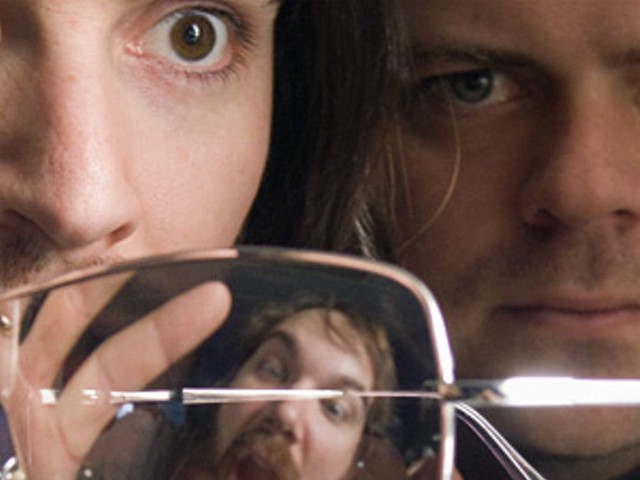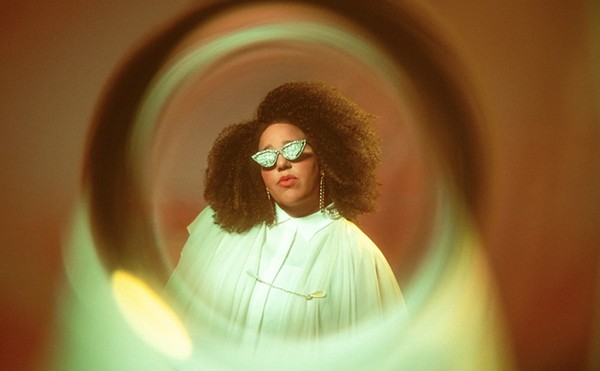The band's personalities are just as diverse. Rogers — a Ph.D. candidate in the psychology department at Wash. U. — is goofy and perpetually smiling, whereas Moore is more serious and intense. (Talkative, light-hearted Andrews, the youngest member of the band, falls somewhere in between.) But as the old saying goes, opposites attract. And chemistry of all types — friendship, romance or musical — is completely irrational, wholly intangible and nearly impossible to explain.
What's easier to clarify is why Victoria is starting to turn heads in the local music scene. For starters, its shows are becoming notorious for their raucous, unbridled energy; it's not surprising to find Moore writhing on the floor onstage, or Rogers dancing with charming unselfconsciousness.
The band's upcoming debut EP, Ghost Town, captures this white lightning in a bottle. Shades of Kings of Leon's Southern-rock swing (especially in Moore's howl) abound, matched by equal doses of Aerosmith and Led Zeppelin's rumbling blues-boogie, Pearl Jam's garage-thrash and even Jon Spencer Blues Explosion's sexed-up distortion. "Holy Roller" — a two-minute burst that comes at listeners like a raging fireball — is the clear standout, although the subtle groove of other tracks is just as seductive.
Victoria started in 2005, when preacher's son Moore (who grew up playing music in the church, but had no previous band experience) suddenly woke up one morning and decided he needed to be in a band.
"I realized I wanted to do what's in my heart, [and] not wake up when I'm 40 and regret not doing what I feel like I should do," he says. "I auditioned a ridiculous amount of people — and the audition for bass players was over when I met Chad. We had instant chemistry.
"He showed up in an old Volvo, and he had, like, this professor's outfit on. And I'm like, 'This dude is interesting! I like him already, he's in.'" (Rogers, laughing, interjects: "I was like, 'Who is this tall guy?'")
Finding a permanent drummer was a bit more difficult. The band worked with, among others, Patrick O'Bryan (now in Stella Mora) and Magnolia Electric Co.'s Pete Shriner, who was living in town for a spell. The lineup eventually gelled when Moore met Steve Andrews via Tomahawk Apostle's Taylor Perry (like Andrews, a Guitar Center employee). The key word being "eventually."
"We didn't connect at first, I'm gonna be honest," Andrews says. "I've told this to David, I thought he was weird as shit when he first asked me. One day Taylor comes in [to Guitar Center] with this dude in this fur [coat]... it's a long dress coat you would wear in the '70s with some sort of purple suit or something. He comes and is like, 'Hey, Steve, this is my friend Dave. Want to play in his band?'"
Andrews — who was already in several bands — was skeptical. But after finally listening to Victoria's music and a few jam sessions, he was converted.
"I really didn't think I was going to be interested at all," Andrews says. "I thought it was going to be some stupid indie-rock band, some lame band that there's 50 million of in this country. But it wasn't. The songs are pretty powerful."
This goes for Victoria's lyrics as well as its music. Although Moore hesitates to elaborate on song meanings ("Lyrics are the most vulnerable thing, because it's a window that people can look through and pretty much know what you're thinking and interpret it 50,000 different ways," he says. "It's one of my most vulnerable areas to talk about.") one senses that he's using the analytical to attempt to figure out the intangible, to help himself make sense of the past, present and future.
"People are really thirsty for something that's real, that's not a cookie-cutter fabrication — or like, plastic souls," he says. "If it's not real, and you're not really feeling it, and you can't really get lost in it, I don't really care to do it."
A decoration in its practice space — a map of the world with the phrase "Our Goal" scribbled on it — reflects this singular, ambitious focus. Cynics might construe this as arrogance, but Victoria's passion comes from a genuine desire to make a lasting, meaningful impression.
"I would like to think that our music together could provoke people to do something different in life," Moore says. "It's really a lot bigger than rock & roll. There's a lot we want to say to the world. You can let a song into your heart way deeper than you'll ever let a person. I love the power of music, that that can have."





